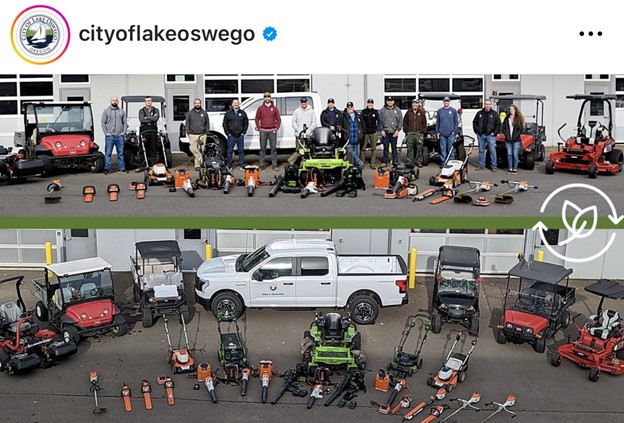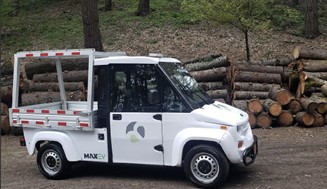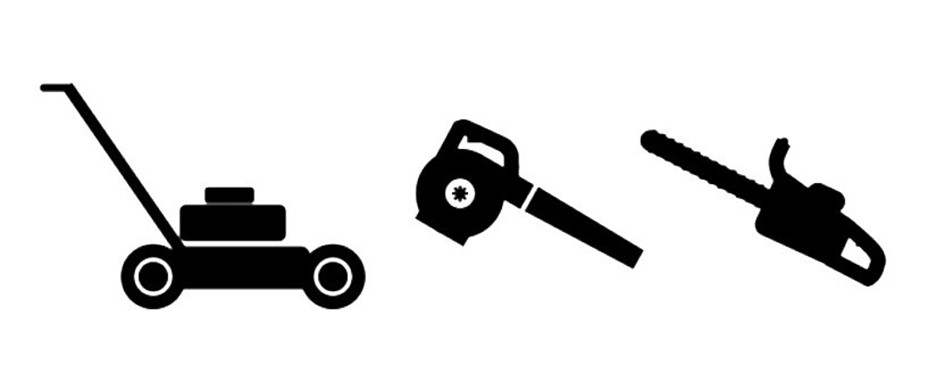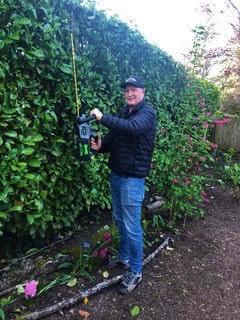|
|
It’s Clean, It’s Quiet, It’s Healthy
Electrify Your Landscaping and Healthy Yard Care
The Lake Oswego Sustainability Network is launching a campaign to support healthy yard care practices and the transition away from gas-powered landscaping equipment (GPLE). Gas-powered landscaping equipment causes significant air and noise pollution that negatively impacts workers, neighborhoods, habitat, and health of the soil.
The campaign will contribute to the achievement of the City’s Sustainability and Climate Action Plan goals by supporting the reduction of air and noise pollution in the community. It will include citywide mailers, newsletters, social media, website informational content, letter writing campaigns, and public events.
In this Issue:
- Reasons to eliminate the use of Gas-powered Landscaping Equipment
- The Advantages of Electric
- Healthy Yard Care
- Residential Solutions
- What the City of Lake Oswego is doing
- Case Study – Mountain Park HOA
- Portland Ban on Gas-Powered Leaf Blowers
- Education and Training – American Green Zone Alliance
- How you can help
- Additional resources
- Electrify Oregon
|
Reasons to Eliminate the Use of Gas-Powered Landscaping Equipment
Gas-powered landscaping equipment is responsible for significant air and noise pollution. Operators of this equipment can be particularly affected. Many types of hand-held landscaping equipment use 2-stroke engines, which are the worst offenders.
Gas-Powered Leaf Blowers
EXTREME NOISE
Because it is low-frequency and high-decibel, the noise of a gas-powered blower is significantly louder than an electric one. It permeates walls and negatively impacts up to 90 surrounding homes. The noise contributes to hearing loss, hypertension, and stress.
HEALTH RISKS
2-stroke engines burn a mixture of gasoline and oil, and they produce exhaust fumes laden with high levels of benzene, butadiene, formaldehyde, and fine particulates, all of which are known carcinogens and associated with respiratory, cardiovascular, and neurological harm.
ENVIRONMENTAL HAZARDS
Their toxic waste and smog-forming emissions harm ecosystems and contribute to the climate crisis. Gas leaf blowers create up to 200-mph wind force which sends dust that can contain pollen, mold, animal feces, heavy metals, and chemicals from herbicides and pesticides into the air.

|
The Advantages of Electric
Electric landscaping tools are clean, quiet, safe and convenient. They cost less to operate than their gas counterparts. Used in conjunction with healthy landscaping practices, they are better for the health of the landscapers, the neighborhood, and the environment. Today’s electric tools are powerful enough to handle even the biggest jobs.
Some advantages of electric tools:
- Instant start: no pulling cords, priming engines etc.
- Excellent cutting, blowing and trimming power
- Long run times and easy battery swap outs
- Multiple tools can use the same batteries
- No refilling fuel tanks, engine oil and gas cans
- No replacing spark plugs, air filters and fuel filters
|
Healthy Yard Care
Using electric yard care equipment is important, but how you use that equipment is even more important. We need to think of our yards as natural living systems.
These systems include a variety of plants, animals and microorganisms, all working together to promote a robust landscape.

Let’s look at some examples:
Lawn Mowers
It’s great to use a quiet, clean electric lawn mower, but what happens when you follow up with an application of artificial fertilizer? Organisms in the soil are killed by the chemicals. The natural process that allows worms and soil microorganisms to flourish and naturally support plant growth is lost. These organisms are providing natural fertilizers and releasing nutrients that support plant growth. The natural system is destroyed.
Leaf Blowers
It is great to eliminate the noise, but what happens when all of the leaves are removed from the soil? That material that feeds the soil is lost and the complex system of insects, worms, and microorganisms is disrupted. Soil health is severely compromised, and healthy soil means a thriving garden. So it’s fine to blow leaves off of paths, patios and other hard surfaces, but leave the leaves on the soil and support a healthy natural system in your garden.
Electrifying your landscaping tools is very important – but remember to use those tools in a manner that supports a healthy, sustainable garden.
Sustainable Practices
- Leave the leaves – leaves and other plant matter under trees and shrubs help build mulch, healthy soil, and habitat for pollinators and wildlife.
- Grasscycling – leave grass clippings on the lawn or use a mulching mower. Clippings are a natural fertilizer, beneficial for the lawn, and will decompose and disappear quickly.
- Avoid fertilizer and pesticides – most yards do not need these dangerous chemicals which are harmful to wildlife, insects, and waterways.
- Plant care – avoid the use of leaf blowers around plantings as they erode and compact the soil, and damage habitat for beneficial insects and pollinators.
- Help pollinators – plant native plants and flowers with staggered blooming times, and do not use pesticides.
- Reduce or replace your lawn – lawns take lots of water and labor to maintain.
- Reduce the size of your lawn or replace it with plants that take less water and maintenance and provide habitat for insects and birds.
- Use a broom or rake instead of a gas blower to eliminate massive pollution, dust, and noise. They are more efficient tools than many people think.
Here are more resources for tips on healthy landscaping practices:
https://losn.org/wp-content/uploads/2024/03/All-Electric-Yard-Care-Fact-Sheet-.pdf
https://losn.org/wp-content/uploads/2024/03/Las-ventajas-de-las-herramientas-electricas-de-jardineria.pdf
Here are some local organizations that offer more information, programs, and guidance on Healthy Yard Care. You can sign up to become certified with Backyard Habitat, become a member of Xerces, and get involved with the Oswego Lake Watershed Council.
  
|
Residential Solutions
As residents, there are many things we can do to help with the transition away from gas-powered equipment. We now understand that gas-powered equipment, especially blowers, harms the health and well-being of all. Eliminating their use around your home and your neighborhood alone will have a significant impact.
Ask your landscaper to use rakes and brooms whenever possible to keep the hardscape areas of your home clean.
If your landscaper needs a power assist, ask them to use electric equipment only.
If your landscaper does not have electric equipment, here are ways you can help them make the transition away from gas-powered equipment:
- Provide your landscape contractor with electric equipment to be used on your property.
- Offer to share in the cost: Suggest to your landscaper that if they purchase the equipment, you will provide them with the appropriate battery to use on your property, fully charged and waiting for them on your day of service.
- If your landscape area is relatively small, corded electric equipment might be a good solution; extension cords and an exterior outlet eliminate the need for charging batteries.
- Adopt-a-landscaper: If your landscaper services other properties in your area, consider sharing the cost among neighbors.
Residential Landscapers
Many landscaping services in our region already offer electric services. A story from Oswego Yard Care shows why businesses are moving towards this model:
Dan Fidle r and Lonny Chavez started Oswego Yard Care in 2019 with the desire to create a landscaping business using quiet renewable energy. They use all-electric battery-powered Ego brand tools that greatly reduce noise pollution and have no gas fumes. Every kWh of energy they use to recharge their equipment is offset with the purchase of clean renewable energy. They have enthusiasm for innovation and insistence on clean energy. Oswego Yard Care maintains and creates beautiful yards by combining seasonal color, native plants, and perennials. Dan and Lonny encourage other landscapers to check out their equipment to experience for themselves how great this electric equipment works. Visit oswegoyard.com for more information. r and Lonny Chavez started Oswego Yard Care in 2019 with the desire to create a landscaping business using quiet renewable energy. They use all-electric battery-powered Ego brand tools that greatly reduce noise pollution and have no gas fumes. Every kWh of energy they use to recharge their equipment is offset with the purchase of clean renewable energy. They have enthusiasm for innovation and insistence on clean energy. Oswego Yard Care maintains and creates beautiful yards by combining seasonal color, native plants, and perennials. Dan and Lonny encourage other landscapers to check out their equipment to experience for themselves how great this electric equipment works. Visit oswegoyard.com for more information.
Here are some landscaping companies that offer alternatives to gas-powered landscaping equipment in Lake Oswego:
- AK Lawn Maintenance
- Blessing Landscapes
- Blossom
- Clean Air Lawn Care PDX
- Dennis’ 7 Dees
- Flower Bug Gardening
- Neighborhood Gardeners SW
- Northwest Native Landscapes
- Oregon Garden Ninjas
- Oswego Yard Care
- Phoenix Habitats
- Plantzy Gardens and Designs
- Revive Gardens PDX
- Rogue Ecology
- SKLD Landscape Design
- Swamp Rose Ecology
- Symbiop
- Terraccord Landscapes
- Tommy’s Landscape
|
What the City of Lake Oswego is Doing
The City of Lake Oswego has already taken important steps to eliminate gas-powered equipment from its contracted landscape services for 200 city-owned sites and has replaced much of the gas-powered equipment used by Parks and Public Works.

Parks and Recreation
Jeff Munro, Deputy Director
The Parks Department’s transition to electric tools aligns with our dedication to maintaining beautiful parks while being kind to our earth and environment. We have added all types of electric equipment including blowers, hedge trimmers, chainsaws, push mowers, riding mowers, utility vehicles, and a new Ford F-150 that can power up equipment in the field. Our Parks Multiple Site Landscape Contract also requires that the contractor that maintains some of our facilities & parks only use electric equipment to perform their maintenance tasks.
Our commitment to Sustainability is powering our parks with electric tools and vehicles that reduce emissions and minimize our carbon footprint. The Parks Department will continue to integrate this electric initiative into daily practice and continue to source new equipment and battery types along with continuing with the City Council’s goals on climate and sustainability practices with fleet policies.
Public Works
The Public Works Department has had an electric contract with STORM Landscape Services since 2021.
STORM Landscape Services is a commercial landscape company that has 6 crews that are all electric. In a recent interview, Randy Mihaldo shared details about his work with the City and his transition to electric landscaping equipment. Read the full story…
|
Transitioning to Electric Landscaping Equipment: A Case Study with Mountain Park HOA
Tod Blankenship, Director of Landscape Stewardship

I personally have been researching and purchasing small battery equipment for over 10 years. When I was with the City of Wilsonville, I began spearheading a transition to Stihl battery-powered small equipment. Stihl has long been a champion of landscape equipment. When it comes to committing to battery-powered equipment there are many factors to be considered beyond the craftsmanship and reliability of the tool itself. It is also a commitment to batteries and chargers. Stihl has been at the forefront of battery technology, and it was an easy decision for us.
MPHOA Landscape Stewardship Division has purchased nearly all of the Stihl commercial battery-powered tools available. When it comes to the replacement of any light equipment we will purchase a battery option if available. We have found most of the items suit our needs as long as we have plenty of extra batteries. The disappointment has been the limited backpack blower options. A new Stihl electric backpack blower is now available and we plan on buying 5 additional blowers this year. We have also purchased (2) Westward electric low-speed vehicles for use on the road and throughout our 9 miles of trails.
|
Portland Ban on Gas-Powered Leaf Blowers
On March 13, 2024, Portland City Council unanimously passed an ordinance phasing out gas-powered leaf blowers citywide. (2-minute video of the 5-0 decision) Starting January 1, 2026, gas blowers will be prohibited for 9 months of the year (Jan-Sep). A full year-round ban will begin on January 1, 2028.
Portland is the second largest city to adopt such an ordinance, behind only Washington, D.C. This ban complements the steps being taken by Multnomah County to transition county leaf blower use to electric before 2025, and the city of Portland’s effort to switch out their stock of gas-powered leaf blowers for quieter and cleaner electric models. It is overwhelmingly clear that the public is asking for gas leaf blowers to be phased out. When public comments were solicited by the city of Portland, 86% of the 786 commenters supported a prohibition of gas leaf blowers and only 11% opposed it in any way.
For more details see this Oregonian article by Gosia Wozniacka https://www.oregonlive.com/environment/2024/03/ban-on-gas-leaf-blowers-passed-in-portland-gradual-phase-out-begins-in-2026.html
For more information on the Equitable Gas Leaf Blower Phase Out visit https://www.portland.gov/bps/climate-action/leaf-blowers/glb-phase-out
Here is a summary of the ordinance https://files.constantcontact.com/3a61126a001/18fa76f4-3c8d-45d3-b52f-42b5ceeee353.pdf and the ordinance itself
KGW news
https://www.youtube.com/watch?v=U1-YuAKMYl8

Quiet Clean PDX was instrumental in the passage of the Portland ordinance to ban gas-powered leaf blowers. QC/PDX is a Portland based volunteer organization that has been working since 2018 to phase out gas-powered leaf blowers. They have raised awareness of the dangers of gas leaf blowers, advocated for their elimination, and promoted healthier alternatives.
|
American Green Zone Alliance

American Green Zone Alliance (AGZA) is a national leader in low-impact, low-noise landscape solutions. They offer education and training, and they work extensively to field test and certify electric equipment.
In 2021 LOSN partnered with Dan Mabe, founder of AGZA to host an online forum (see link to the forum below). He discussed the air and noise pollution issues with gas-powered equipment, the electric equipment that is available, the cost comparison between gas and electric, and the return on investment. He also discussed what other communities with similar seasons are doing to transition to electric.
In November 2023, AGZA partnered with the National Association of Landscape Professionals (NALP) and the Oregon Landscape Contractors Association (OCLA) to put on a Gas to Electric Symposium on the Nike Campus. Topics included current regulations, low-impact landscape maintenance and operations, funding mechanisms to lower the cost of battery-powered equipment, and commercial equipment demonstrations.

Learn more about AGZA here:
www.agza.net
See the list of AGZA certified electric equipment: https://agza.net/agza-approved-equipment/
Watch the LOSN forum here: https://losn.org/event/%E2%80%8Bmay-2021-online-forum-transitioning-to-electric-landscaping-equipment/
See a short video of the Gas to Electric Symposium here: https://www.youtube.com/watch?v=OrEinIpM_cs
|
How You Can Help
Your participation is important to the success of our campaign. Here are ways you can help us expedite the transition away from gas-powered landscaping equipment and toward more healthy and sustainable practices.
-
Join the Electrify Your Landscaping and Healthy Yard Care Committee
-
Take part in our letter writing campaign
-
Donate directly to our campaign by selecting Electrify Your Landscaping HERE
Please email Kathleen Wiens kwiens@losn.org. for more information.
|
Additional Resources
|

Electrify LO Joins Electrify Oregon
Electrify LO has now joined other Electrify organizations in towns throughout our state in the network “Electrify Oregon.” This month, these 16 organizations launched a combined website with information on the basics of an energy-efficient household and how to find contractors and financial incentives to help you electrify. The website is focused on guiding homeowners toward becoming more energy-efficient and climate-friendly in multiple ways.
|
|


















